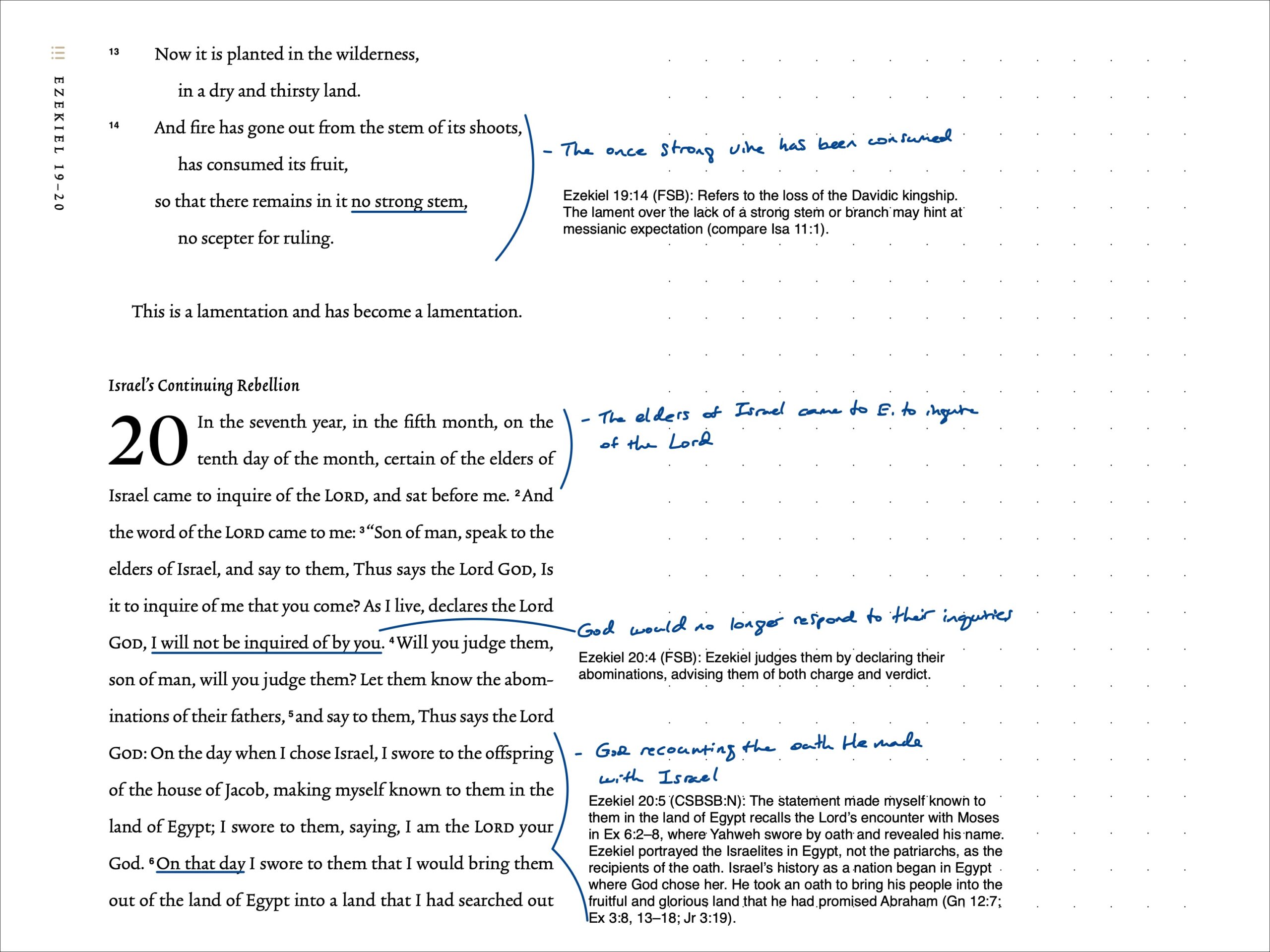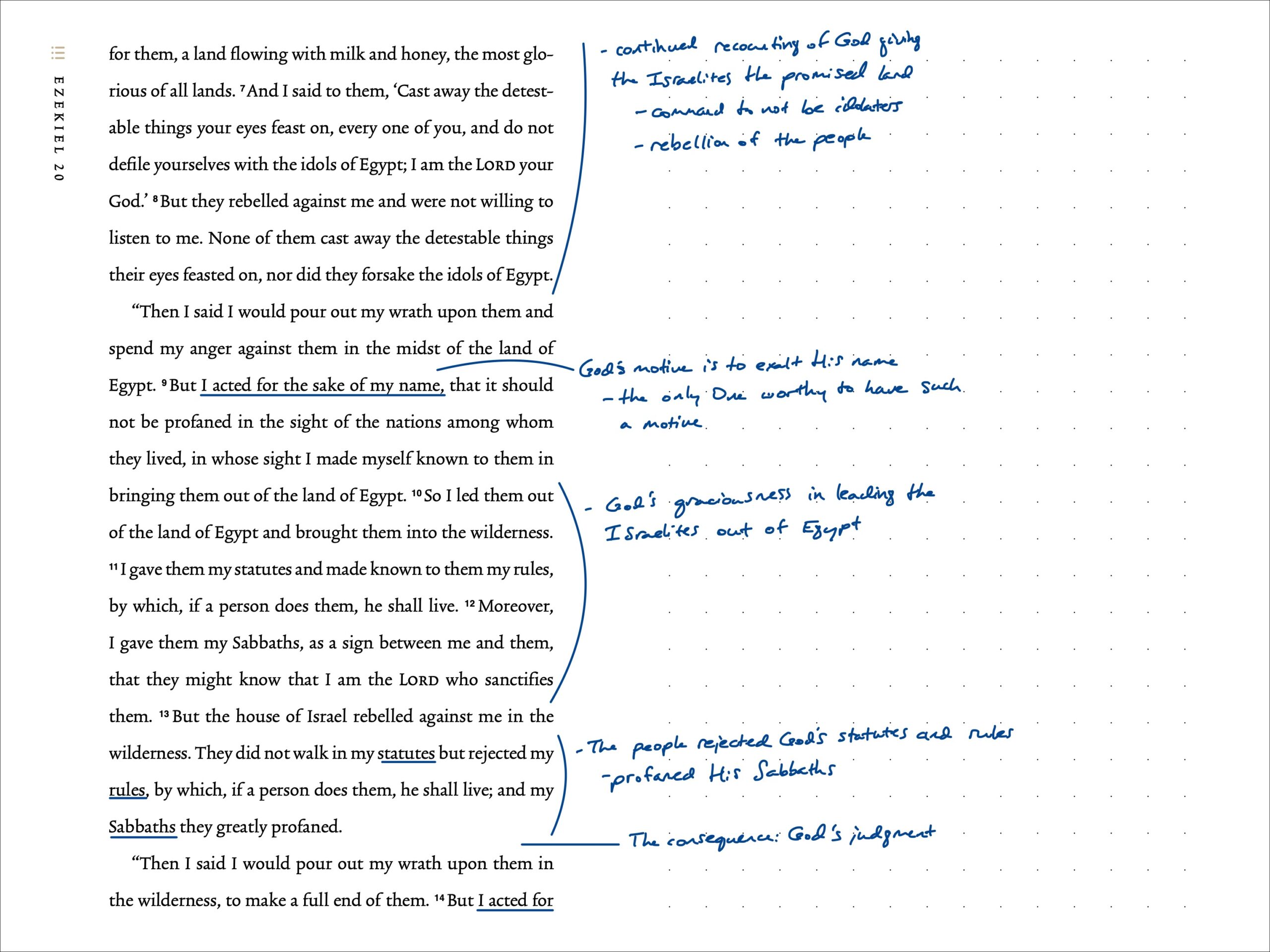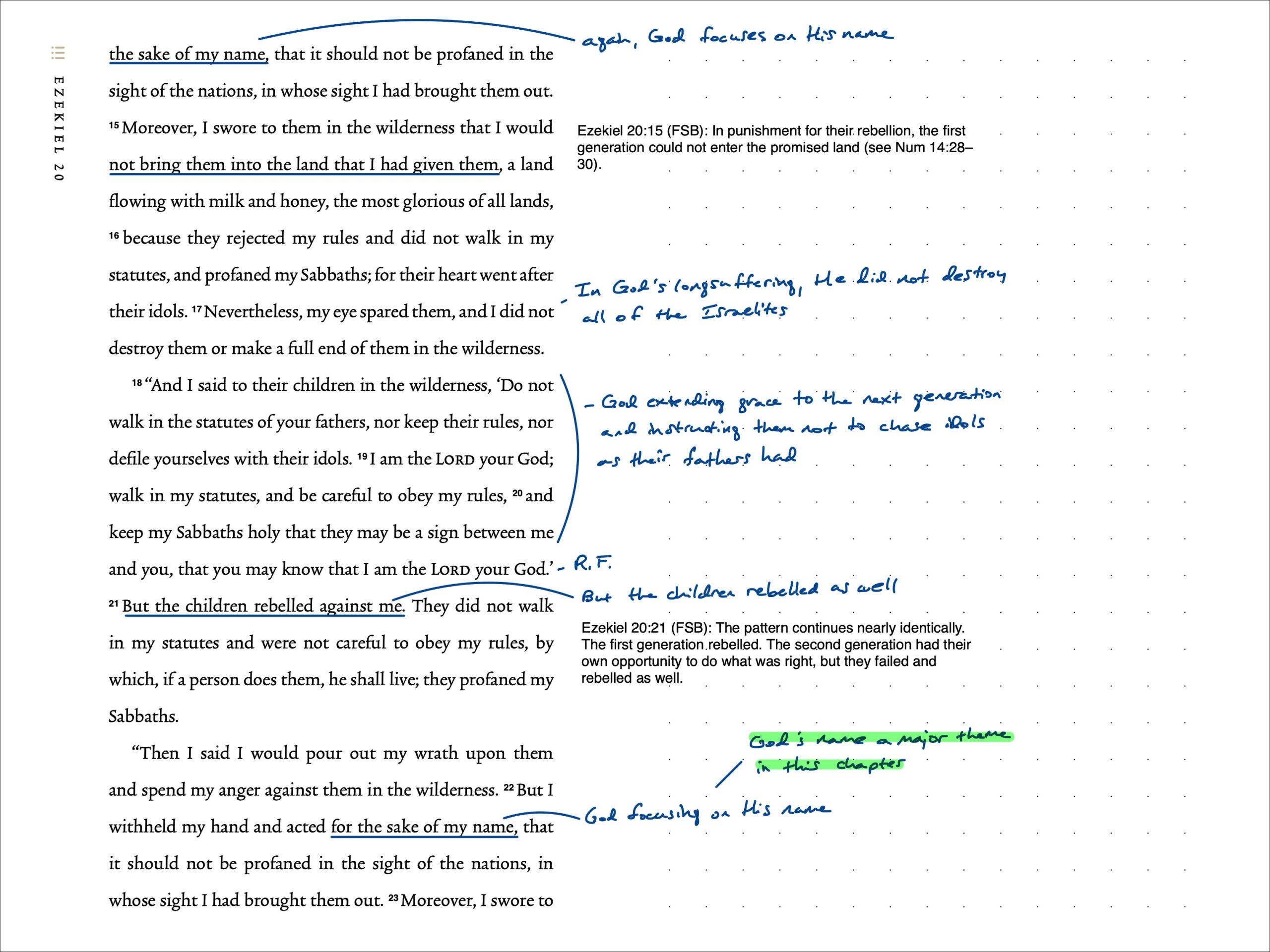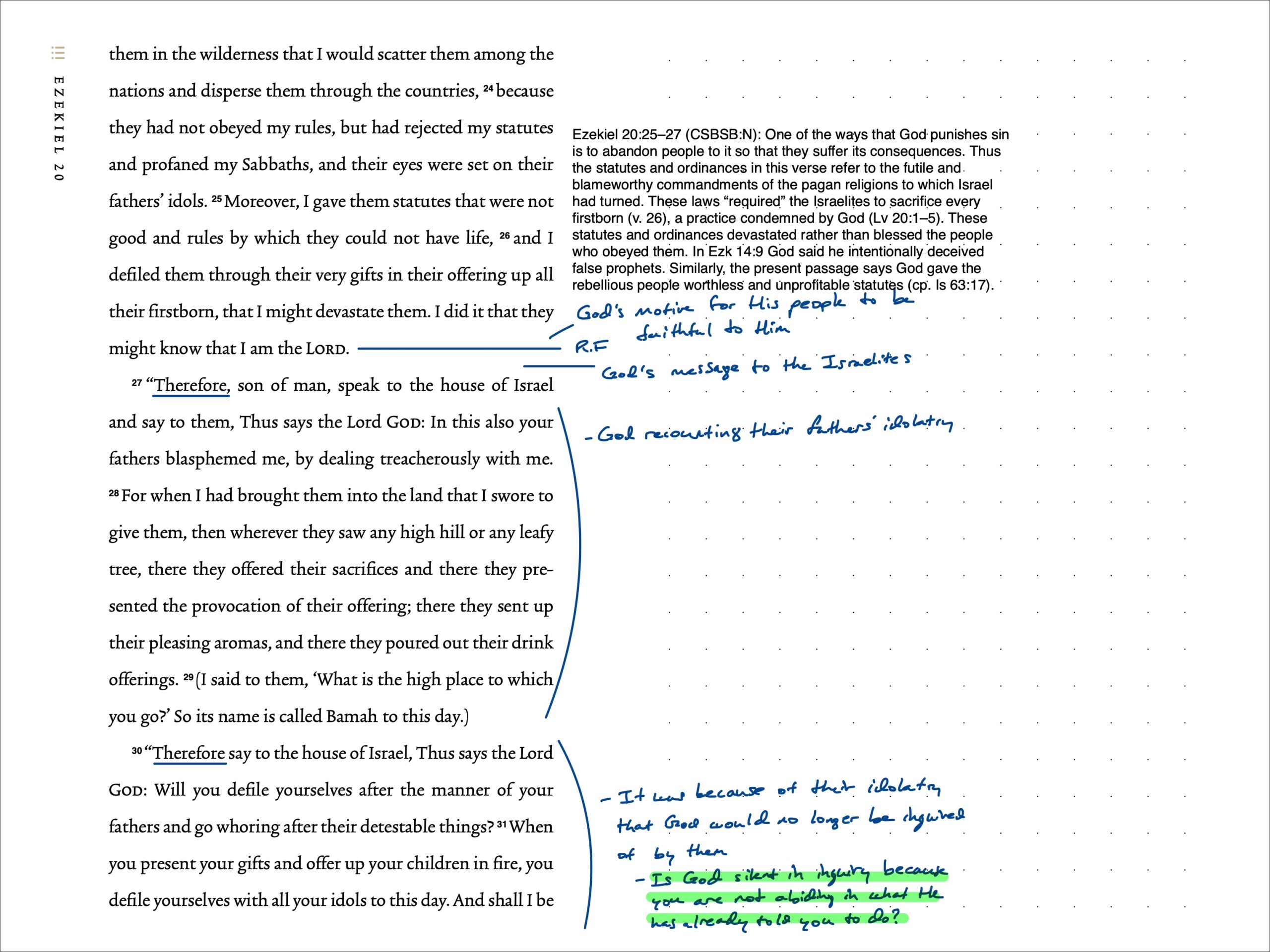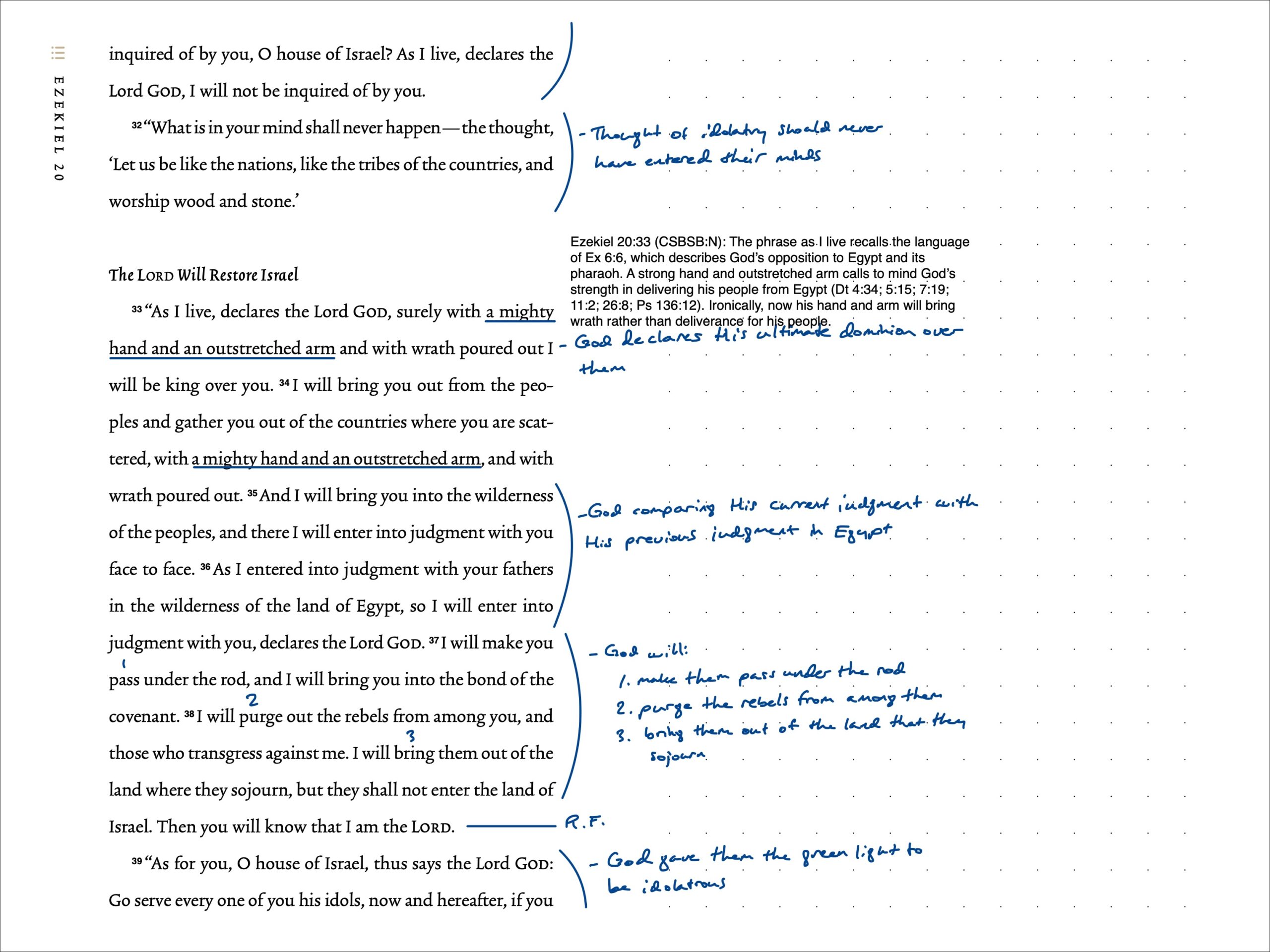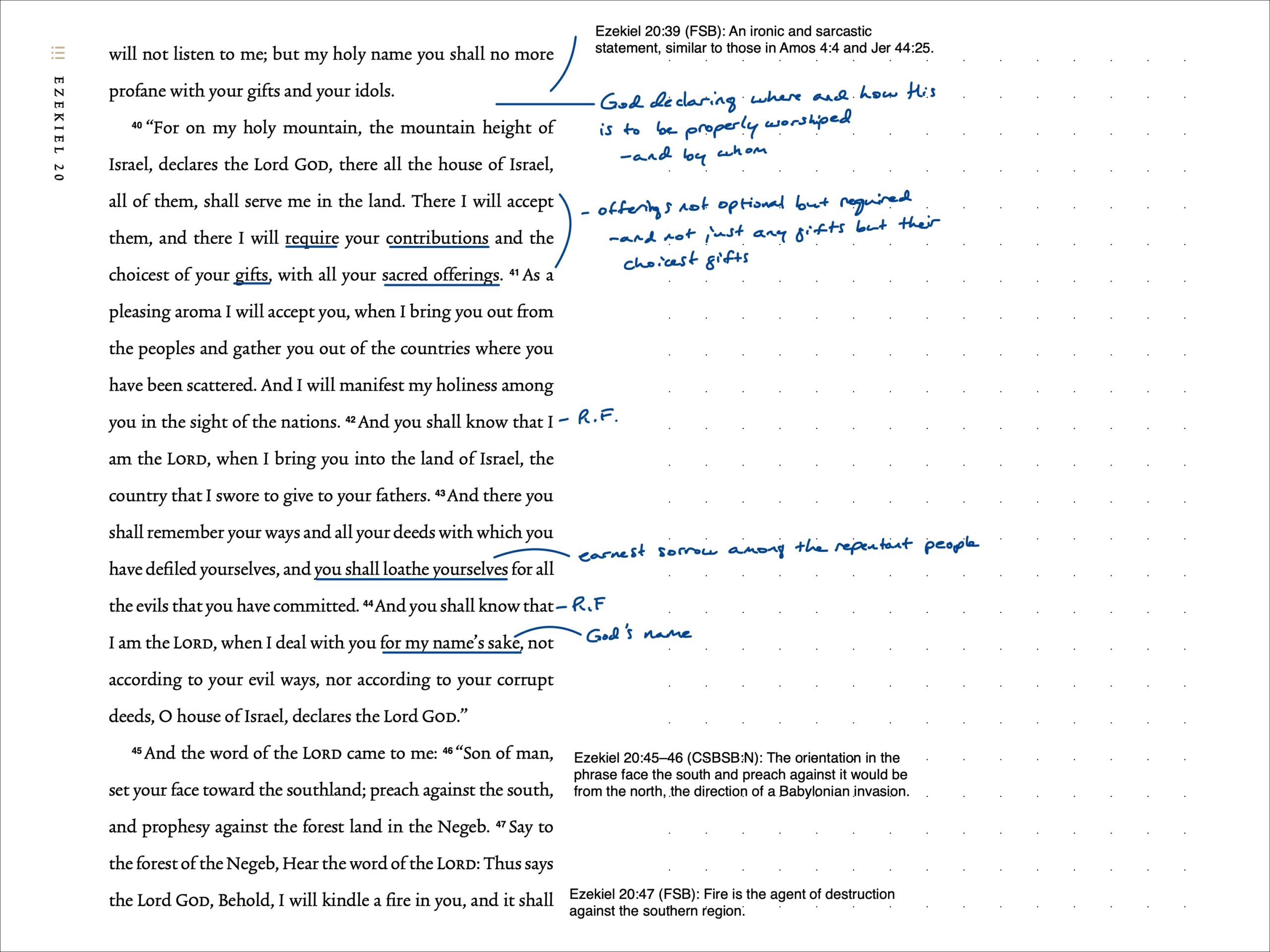| Date | Version | Reading Plan |
|---|---|---|
| @September 10, 2023 | ESV (2016) | ESV Prophets Plan 2023 |
Pericopes
- Israel’s Continuing Rebellion
- The LORD Will Restore Israel
Notes
The chapter opens with the elders of Israel approaching Ezekiel to inquire of the LORD “In the seventh year, in the fifth month, on the tenth day of the month.” If calculated from the beginning of Jehoaichin’s exile (as is typical of Ezekiel), this oracle dates to August 15, 591 BC.
In Ezek. 20:2-8a, God gives His response to the elders’ inquiry; that He would not be inquired of by them (Ezek. 20:3). Ezekiel both judges them and declares their abominations, advising them of both charge and verdict. God then recounts the oath He made with Israel in “making himself known to them in the land of Egypt” (Ezek. 20:5). This recalls the encounter with Moses in Exodus 6:2-8 where God swore an oath and revealed His name. Israel’s history as a nation began in Egypt where God chose her and took an oath with her to receive the fruitful land He had promised Abraham (Gen. 12:7; Exod. 3:8; Exod. 3:13-18; Jer. 3:19). But, they rebelled against Him and “were not willing to listen”, instead feasting their eyes on detestable things and refusing to forsake the idols of Egypt (Ezek. 20:8).
Ezek. 8b-13a is God’s speaking of the past and how he declared his wrath be poured out on them in the land of Egypt. However, for the sake of His name, He graciously relented of His wrath and led the people out of Egypt (Ezek. 20:9). What’s more, He gave them His statutes and rules so that they could live for Him (Ezek. 20:11) and His Sabbaths that was to be a sign between Him and His people that they might know Him and the One who sanctifies them (Ezek. 20:12). God rescued His people and imparted to them an abundance of blessings, but the people still did not walk uprightly. They did not walk in His statutes but rejected His rules and profaned His Sabbaths (Ezek. 20:13).
Ezek. 13b-17 is the consequence of this ingratitude and rebellion: God’s judgment. The punishment was to be for those of the wayward first generation who would not be able to enter the promised land (see Num. 14:28-30). Even with this punishment, God’s grace shined through as He chose not to destroy the nation as a whole.
Ezek. 20:18-26 is of God’s instruction to the “children in the wilderness”, the generation allowed to reach the promised land, to not “walk in the statutes of your fathers” and so defile themselves with the same idols in that they may know Him (Ezek. 20:20). But, even the new generation was unresponsive to God’s commands and persisted in sin (Ezek.20:21). God again said that He would pour out His wrath but again withheld His hand for the sake of not profaning His name (Ezek. 20:22). In Ezek. 20:25, God said that He gave them “statutes that were not good” which were those that set a standard they could not meet. All this that they might turn to Him and know that He is the LORD (Ezek. 20:26).
Ezek. 20:27-32 is a recounting by God of their fathers’ idolatry and that this was the cause of their now inability to inquire of Him. The thought they had to be like other nations was never to happen (Ezek. 20:32). This is an allusion to the account of the of the choice of the initial Israelite king in 1 Sam. 8. This led to the election of Saul as Israel’s first king. The designation of the heathen gods as wood and stone should have been enough to signal that these heathen gods were mere fictions.
Ezek. 20:33-38 is God’s declaration that He will be King over them with “wrath poured out”. This describes God’s opposition to Egypt and its pharaoh. A strong hand and outstretched arm calls to mind God’s strength in delivering his people from Egypt (Deut. 4:34; Deut. 5:15; Deut. 7:19; Deut. 11:2; Deut. 26:8; Ps. 136:12). Ironically, now his hand and arm will bring wrath rather than deliverance for his people. God compares His current judgment on the people with His preceding judgment on them in Egypt (Ezek. 20:36). In a sequential process, God will 1) make them pass under the rod (Ezek. 20:37), 2) purge out the rebels from among them (Ezek. 20:38) and 3) bring them out of the land where they sojourn. Again, all that they may know Him as LORD (Ezek. 20:38).
In Ezek. 20:39, in an ironic and sarcastic statement similar to Amos 4:4 and Jer. 44:25, , God gives the people a green light to continue in their idolatry, saying, “Go serve every one of you his idols, now and hereafter, if you will not listen to me.” They could go and follow their sinful desires but no longer profane His name with their gifts and idols, demonstrating how worshiping God in the wrong way is just as bad as pure idolatry.
In Ezek. 20:40-44, God gives instruction on how He is to be properly worshiped. Offerings would be required by only among the “choicest of their gifts” and “sacred offerings” (Ezek. 20:40). In this, He will bring them “out of the countries” where they had been scattered (Ezek. 20:41) and again revealing His motive that they would know Him (Ezek. 20:42). This repentant remnant to be saved would come to loathe themselves for the evils they had committed. God makes clear that His gracious dealings with them was not according to their evil ways or corrupt deeds but for His name’s sake (Ezek. 20:44).
The remaining verses (Ezek. 20:45-49) are a command of God for Ezekiel to set his face “toward the southland” to “preach against the south” and “prophesy against the forest land in the Negeb”. This southward orientation would be from the north, which was the direction of the Babylonian invasion. God would kindle a fire to “devour every green tree” in them and “every dry tree”, denoting destruction of all vegetation. All this leading to the final verse (Ezek. 20:49) where Ezekiel replies to God what they were saying of him, “Is he not a maker of parables?” Ezekiel wondered whether his parables and metaphors were getting through to his audience. Perhaps the people had come to hear him more for the entertainment value of his artistic word-images than for the conviction that should come from hearing God’s message.
Application
The elders of Israel had come Ezekiel to inquire of the LORD and a couple of things were particular prominent in what God gave him to instruct them. First, that God would longer be inquired of by them. He had turned His face from them because they had actively rejected His clear instruction on how to live in surrender and obedience to Him. Applied to us, if we sense God’s distance or unresponsiveness to prayer, we may need to take a sounding of our lives and determine whether we are walking in obedience to what He has already told to do. Care must be taken as I say this because there could be other reasons, but such times present opportunities to examine ourselves.
The second major theme in the chapter is God focus on His own name and that it not be profaned. As Creator of all things, God alone holds the ability to swear by Himself. There is no other name higher than the Lord on which to swear and no other name more worthy. When it is profaned, the consequences are dreadful. The Lord’s name is the highest of all honor and glory, deserving of our reverence, worship and praise.
Scripture Journal Notes
Commentaries & Resources Used
- ESV Study Bible. (Wheaton, IL: Crossway, 2008)
- Faithlife Study Bible (Lexham Press, 2016)
- Believer’s Bible Commentary (Thomas Nelson, 2016)
- CSB Study Bible Notes (Holman Bible Publishers, 2017)
- Matthew Henry’s Commentary on the Whole Bible (Guardian Press, 1976)
- The Bible: A Reader’s Guide (Sterling Publishing, 2011)
- The Infographic Bible (Zondervan, 2018)
- ESV Digital Scripture Journal (Crossway, 2019)
